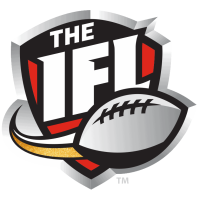
Over a Cup of Coffee
by Jerry Hewitt
Published on April 2, 2010 under Indoor Football League (IFL)
I do not pretend to know how to build a winner on the field, but from the outside and my long experience with the game, I feel am qualified to make some observations.
In football we deal with three main styles of play: the traditional 100 yard outdoor, arena, and indoor. All three require a different type of player.
In arena and indoor there are two qualities that define the player more so than in the traditional 100-yard game: quickness and fearlessness. With the smaller size of the fields I feel quickness as opposed to overall speed counts more and extends to all positions on both sides of the ball. Much like basketball which also has fewer players participating at one time, quickness counts more. Fearlessness comes into play because of the dasher boards and players having to ignore those barriers during play. Some very good players, successful in the outdoor game, have failed in arena and indoor football because they can not overcome the barrier factor. Let's be honest, just knowing the dasher boards are out there ahead of a player going at full speed is scary.
Of course, that's being very simplistic on what sets the indoor and arena player apart from the outdoor player as there is much more to being successful than just those two elements. I also feel that having players who think quickly on their feet is a valuable asset, but that more or less applies to all games, not just arena or indoor.
The above is where I feel the building of an arena or indoor football team ends as the two differ in style of play. I have been watching as teams and coaches move over from arena to indoor and how quickly they pick up on the nuances of the game determines for the most part their success.
The biggest differences I see are that a running game is important in indoor, but not in arena, and defense is more important in indoor than in arena. My reasoning is simple. Arena ball is built on the offense and the passing game, while indoor ball is built more along the lines of the traditional game. And yes, it is that simple.
In arena ball the running game typically accounts for under ten percent of the action where in indoor ball successful teams strive for a more balanced run and pass attack. In arena, the rules clearly favor the offense and are designed to put up lots of points, leaving the defense's hands tied. Indoor ball favors the offense as well as putting up points, as lots of points are believed to be what fans want, but at the same time, the defense is not handicapped as much. I think there is an old saying, offense entertains, defense wins games.
Teams and coaches coming over to indoor ball from arena may be inclined to build their team from the arena side of things, offense first, when they should be looking at building the defense first. Those teams coming over from arena ball seem to have little problem scoring big numbers, but allow even bigger numbers in some cases.
Through the years I've seen defenses in the indoor game improve because most have figured out they are important. The better teams in the various leagues still put up plenty of fan-pleasing points, but hold their opponent's scores down. Gone are the days in indoor when he who has the ball last wins. It's no longer just a scoring fest. Good teams, teams that have actually made the defense the priority, win games. Their defenses are able to step up and make stops when the game is on the line. There are plenty of teams in the various leagues than can run up points on the scoreboard, but only a handful that can keep other teams from doing the same. It's the same handful that win the championship.
This article and more archived at The Indoor Football Report located at www.IndoorFootballNetwork.com Comments about this article or suggestions can be made to indoorbowl@yahoo.com
Indoor Football League Stories from April 2, 2010
- Darnerien McCants to Sing National Anthem at Maniacs Cole Field House Debut - Maryland Maniacs
- Blizzard Head East to Open Three Week Road Trip - Green Bay Blizzard
- Wild And Storm To Battle For First Place On Saturday - Wichita Wild
- Over a Cup of Coffee - OSC Original by Jerry Hewitt
- Maniacs Tickets On Sale Home Opener Saturday, April 3rd - Maryland Maniacs
The opinions expressed in this article are those of the writer(s), and do not necessarily reflect the thoughts or opinions of OurSports Central or its staff.

